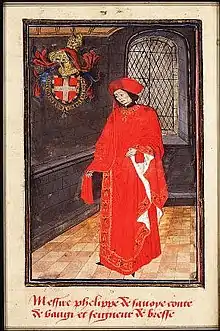| Philip II | |
|---|---|
 Philipp II in the manuscript Statuts, Ordonnances et Armorial de l'Ordre de la Toison d'Or, c. 1473 | |
| Duke of Savoy | |
| Reign | 16 April 1496 – 7 November 1497 |
| Predecessor | Charles II |
| Successor | Philibert II |
| Born | 5 February 1438 Château de Chambéry, Duchy of Savoy |
| Died | 7 November 1497 (aged 59) Château de Chambéry, Duchy of Savoy |
| Spouse | Marguerite de Bourbon Claudine de Brosse |
| Issue | Louise, Countess of Angoulême Philibert II, Duke of Savoy Charles III, Duke of Savoy Philippe, Duke of Nemours Philiberta, Duchess of Nemours René of Savoy (illegitimate) Antonia of Savoy (illegitimate) |
| House | House of Savoy |
| Father | Louis of Savoy |
| Mother | Anne of Cyprus |
| Religion | Roman Catholic |
Philip II (5 February 1438 – 7 November 1497), surnamed the Landless, was the Duke of Savoy for a brief reign from 1496 to 1497.[1]
Biography
Philip was the granduncle of the previous duke Charles II, and the youngest surviving son of Duke Louis of Savoy and Anne of Cyprus. However, he was not the heir general of the previous duke, there being several females before him in the line of succession. To ensure male inheritance to the Savoy line, his eldest son Philibert was married to his cousin, the only sister of the deceased young Duke. However, the plan did not succeed: the girl died at age twelve. (Philip had already died in the meantime.) The children of the daughters of Philip's eldest brother Duke Amedeo IX of Savoy were next in line, and were entitled to the inheritance of the line of heirs-general, including Cyprus and Jerusalem. Despite the fact that Cyprus and Jerusalem did not bar succession in female line, Philip took those claims and used those titles as well. His male successors in Savoy also continued to do so, thus giving their ducal title a higher, royal titulary.
He spent most of his life as a junior member of the ducal family. His original apanage was the district of Bresse,[2] close to the French and Burgundian border, but it was lost and therefore Philip received his sobriquet "the Landless", or "Lackland".
Family
First marriage
He married Margaret of Bourbon (5 February 1438 – 1483)[3] and had:
- Louise (1476–1531), married Charles d'Orléans, Count of Angoulême,[2] had children including:
- Francis I of France[4] whose daughter Margaret of Valois married to Emanuele Filiberto of Savoy.[4]
- Marguerite of Navarre (1492–1549); Queen consort of King Henry II of Navarre[4]
- Girolamo (1478)
- Philibert II (1480–1504)[5]
.svg.png.webp)
Second marriage
He married Claudine de Brosse of Brittany (1450–1513),[6] daughter of Jean II de Brosse and Nicole de Châtillon, and they had:
- Charles III (1486–1553) who succeeded his half-brother as Duke of Savoy
- Louis (1488–1502)
- Philip (1490–1533), duke of Nemours
- Assolone (1494)
- Giovanni Amedeo (1495)
- Philiberta (1498–1524),[6] married Julian II di Medici (1479–1516), duke of Nemours[7]
Illegitimate issue
He also had eight illegitimate children by two mistresses.
With Libera Portoneri:
- René of Savoy (1468-31 March 1525), served as Governor of Nice and Provence, known as the Grand Bastard of Savoy and father-in-law of Anne, 1st Duc de Montmorency
- Antonia of Savoy, married Jean II, Lord of Monaco
- Peter of Savoy, Bishop of Geneva
With Bona di Romagnano:
- Claudina (Claudia) of Savoy (d. 2 May 1528), married to Jacob III, Count of Horne (d. 15 August 1531).
- Margherita (Margaret) of Savoy
- Giovanna (Johanna) of Savoy
- Michele (Michael) of Savoy, a priest
Philip is an ancestor, through an illegitimate daughter of Honorat II of Savoy, of Joséphine de Beauharnais, first wife of Napoleon.
Ancestry
| Ancestors of Philip II, Duke of Savoy | ||||||||||||||||||||||||||||||||||||||||||||||||||||||||||||||||||||||||||||||||||||||||||||||||||||||||||||||||||||||||||||||||||||||||||||||||||||||||||||||||||||||||||||||||||||||||||||||||||||||||||||||||||||||||||||||||||||||||||||||||||||||||||||||||||||||||||||||||||||||||||||||||||||||||||||||||||||||||||||||||||||||||||||||||||||||||||||||||||||||||||||||||||||||||||||||||||||||||||||||||||||||||||||||||||||||||||||||||||||||||||||||||||||||||||||||||||||||||||||||||||||||||||||||||||||||||||||||||||||||||||||||||||||||||||||||||||||||||||||||||||||||||||||||||||||||||||||||||
|---|---|---|---|---|---|---|---|---|---|---|---|---|---|---|---|---|---|---|---|---|---|---|---|---|---|---|---|---|---|---|---|---|---|---|---|---|---|---|---|---|---|---|---|---|---|---|---|---|---|---|---|---|---|---|---|---|---|---|---|---|---|---|---|---|---|---|---|---|---|---|---|---|---|---|---|---|---|---|---|---|---|---|---|---|---|---|---|---|---|---|---|---|---|---|---|---|---|---|---|---|---|---|---|---|---|---|---|---|---|---|---|---|---|---|---|---|---|---|---|---|---|---|---|---|---|---|---|---|---|---|---|---|---|---|---|---|---|---|---|---|---|---|---|---|---|---|---|---|---|---|---|---|---|---|---|---|---|---|---|---|---|---|---|---|---|---|---|---|---|---|---|---|---|---|---|---|---|---|---|---|---|---|---|---|---|---|---|---|---|---|---|---|---|---|---|---|---|---|---|---|---|---|---|---|---|---|---|---|---|---|---|---|---|---|---|---|---|---|---|---|---|---|---|---|---|---|---|---|---|---|---|---|---|---|---|---|---|---|---|---|---|---|---|---|---|---|---|---|---|---|---|---|---|---|---|---|---|---|---|---|---|---|---|---|---|---|---|---|---|---|---|---|---|---|---|---|---|---|---|---|---|---|---|---|---|---|---|---|---|---|---|---|---|---|---|---|---|---|---|---|---|---|---|---|---|---|---|---|---|---|---|---|---|---|---|---|---|---|---|---|---|---|---|---|---|---|---|---|---|---|---|---|---|---|---|---|---|---|---|---|---|---|---|---|---|---|---|---|---|---|---|---|---|---|---|---|---|---|---|---|---|---|---|---|---|---|---|---|---|---|---|---|---|---|---|---|---|---|---|---|---|---|---|---|---|---|---|---|---|---|---|---|---|---|---|---|---|---|---|---|---|---|---|---|---|---|---|---|---|---|---|---|---|---|---|---|---|---|---|---|---|---|---|---|---|---|---|---|---|---|---|---|---|---|---|---|---|---|---|---|---|---|---|---|---|---|---|---|---|---|---|---|---|---|---|---|---|---|---|---|---|---|---|---|---|---|---|---|---|---|---|---|---|---|---|---|---|---|---|---|---|---|---|---|---|---|---|---|---|---|---|---|---|---|---|---|---|---|---|---|---|---|---|---|---|---|---|---|---|---|---|---|---|---|---|---|---|---|---|---|---|---|---|---|---|---|---|---|---|---|---|---|---|---|---|---|---|---|---|---|---|---|---|---|---|---|---|---|---|---|---|---|---|---|---|---|---|---|---|---|---|---|---|---|---|---|---|---|---|---|---|---|---|---|---|---|---|---|---|---|---|---|---|---|---|---|---|---|---|---|---|---|
| ||||||||||||||||||||||||||||||||||||||||||||||||||||||||||||||||||||||||||||||||||||||||||||||||||||||||||||||||||||||||||||||||||||||||||||||||||||||||||||||||||||||||||||||||||||||||||||||||||||||||||||||||||||||||||||||||||||||||||||||||||||||||||||||||||||||||||||||||||||||||||||||||||||||||||||||||||||||||||||||||||||||||||||||||||||||||||||||||||||||||||||||||||||||||||||||||||||||||||||||||||||||||||||||||||||||||||||||||||||||||||||||||||||||||||||||||||||||||||||||||||||||||||||||||||||||||||||||||||||||||||||||||||||||||||||||||||||||||||||||||||||||||||||||||||||||||||||||||
References
- ↑ Vester 2013, p. ix.
- 1 2 Knecht 1982, p. 1.
- ↑ Jackson-Laufer 1999, p. 231.
- 1 2 3 Knecht 1982, p. xvi.
- ↑ Hand 2016, p. 220.
- 1 2 Cholakian & Cholakian 2006, p. 317.
- ↑ Kemp 2006, p. 344.
Sources
- Cholakian, Patricia Francis; Cholakian, Rouben Charles (2006). Marguerite de Navarre. Columbia University Press.
- Hand, Joni M. (2016). Women, Manuscripts and Identity in Northern Europe, 1350-1550. Routledge.
- Jackson-Laufer, Guida Myrl (1999). Women Rulers Throughout the Ages: An Illustrated Guide. ABC-CLIO.
- Kemp, Martin (2006). Leonardo Da Vinci. Oxford University Press.
- Knecht, R.J. (1982). Francis I. Cambridge University Press.
- Vester, Matthew, ed. (2013). Sabaudian Studies: Political Culture, Dynasty, and Territory (1400–1700). Truman State University Press.